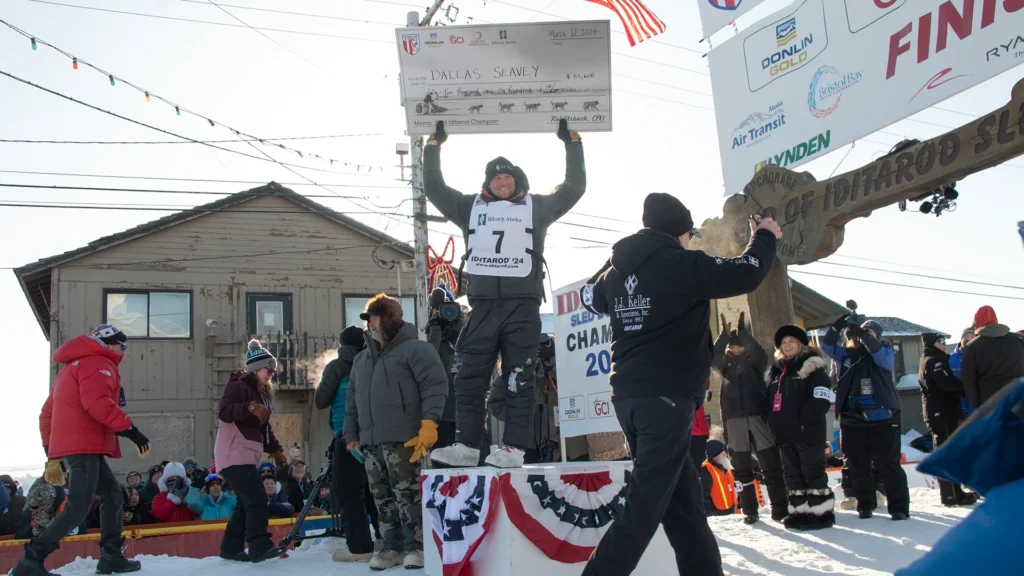A day-long march up the coast and across the sea ice has boiled down to an honest race for Nome, as a father-son duo from Seward battle it out on the Iditarod trail against each other and against an Interior musher who has trained tirelessly to cross under the burled arch ahead of the pack.
This year’s race could come down to a combination of speed and power among dogs and pure grit and desire among mushers.
A northerly headwind blew between 30 and 40 miles per hour and scoured the barren tundra along the Bering Sea Coast as Brent Sass used his ski pole to help his dog team glide across the icy trail to Koyuk.
“Yeah, I didn’t stop kicking or ski poling or kneeling on the sled.”
It was an all-day march to the tiny community perched on a hill overlooking the sea, but Sass was in high spirits as his team rolled into Koyuk in first place.
“Pretty impressive, pretty proud of the dogs. They’re doing awesome.”
But he was well-aware that holding on to his lead would require more than determination and a ski pole, especially when it comes to his competition.
“Those guys might be faster, but I’m not going to die easy.”
Those guys are Mitch and Dallas Seavey. Less than an hour after Sass arrived, the younger, Dallas, pulled into the checkpoint.
Two minutes later, a dog team driven by Seavey’s father, Mitch, also skidded into the tiny village.
“I’m not sure what I’m going to do,” he told the checker. “Did Brent go through?” he asked. “Is Dallas staying?” When he heard his son was going through, Mitch Seavey opted to do the same.
What ensued was a scramble to get out of town.
On one side of the ice-covered street was the black team, led by Dallas Seavey, the youthful former wrestling champ, frantic to stay ahead. He thrashed about, slamming bags of frozen meat on the ground to break the chunks inside apart. His gear was spread everywhere. He tossed small bits of gear around and rifled through plastic bags of everything from dog booties to handwarmers, stocking up on what he needed, discarding everything else.
On the other side, the red team – led by the elder, Mitch Seavey. He moved a little slower, at one point pulling an insulated bucket he uses to hold dog food out of his sled bag so he could sit on it while he transferred gear from his drop bags.
”I’m really tired, and I don’t like not resting the dogs.”
And then the heartwarming climax – father Mitch approached the younger Seavey, the two embraced and quietly shared a few words – muffled by the thick fur ruffs that protected their faces from the fierce Arctic gusts.
Then, they both turned to face the crowd. It was clear the two had been discussing their individual dog teams – Mitch’s confidence in his animals seemed to falter. Dallas offered a supportive word before he pulled his hook and sped away.
When asked what he told his son, Mitch Seavey looked up slyly, and clicked his chicks with a “giddy up” grin.”
With that, Mitch Seavey’s team took off down the trail, loping after his son’s.
The race was on — and it all took place right in front of Brent Sass as his dog team rested.
“We’ll see where the race takes us.”
Sass has the words “Living on the edge” handwritten on the inside of his left forearm, from elbow to wrist.
“Sort of explains my life.”
He says the words have become something of a mantra for him after a forest fire this past summer threatened to burn down his house and incinerate his kennel.
“I decided Aerosmith was going to be my theme song while I was… and then the fire never came, so I was living on the edge.”
Two hours later, Sass pulled his own snow hook and sped away. It’s very likely he’s among many on some kind of ‘edge’ as the top three teams make their way toward the Burled Arch.







